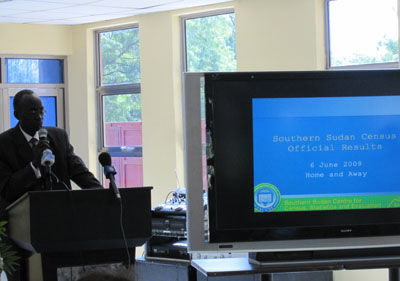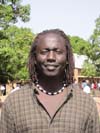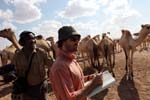“Humanity Check” on the Nile
JUBA, Southern Sudan—I was recently sitting on the bank of the Nile River in Juba, the capital of southern Sudan. I am in Juba to research some of the myriad challenges facing Sudan and the international community in the next 19 months—before the “interim period” of the Comprehensive Peace Agreement, or CPA, ends, and southern Sudan votes in a self-determination referendum for “unity” with or “separation” from northern Sudan. It would be untruthful to say that the situation in southern Sudan is anything other than very grim. The recent violence and death tolls in the South have surpassed the deaths ...
Time to Wake Up From The CPA-Induced Slumber
“If you have something to do with Sudan, do it in the next 19 months, before the country changes." JUBA, Southern Sudan—A southern Sudanese politician said this to me when I was interviewing him. I am here in Juba to research and learn more about the challenges that Sudanese and international actors face in the remaining 19 months of the Comprehensive Peace Agreement’s “interim period.” (When, as the politician said, the country will change, because southern Sudan will vote in a self-determination referendum, for “unity” with the North or “separation” as an independent state of Southern Sudan). This politician was ...
Understanding the Recent Violence in S. Sudan
“The problem is that everyone has guns, and they are willing to use them.”—Kenyan man working as a driver in Juba, southern Sudan, June 2009. JUBA, Southern Sudan—If you’ve been following the news out of southern Sudan recently, then you have good reason to be concerned about the increasingly frequent violent clashes and attacks that have occurred in the past several months. Recently (as noted on our blog), Ashraf Qazi, the U.N. Special Representative for Sudan announced that in recent months, the death rate in southern Sudan from violent conflict has been higher than in Darfur. But who and what ...
S. Sudan Census Bureau Releases Official Results Amidst Ongoing Census Controversy

JUBA, Southern Sudan—The South Sudan census bureau on Saturday released the long-awaited official results of Sudan’s first census since 1983. The results of the census -- a process that has been in the works since 2005 -- have become a highly contentious issue miring relations between North and South; the distribution of the country’s population will be a central feature in Sudan’s upcoming elections in 2010 and the 2011 referendum to determine whether the country will split into two. The South Sudan Center for Statistics, Census, and Evaluation, or SSCCSE, announced the results at a press conference attended by Sudanese ...
Not Enough: U.N. Human Rights Head Voices Concern on S. Sudan
After an 11-day visit to Sudan, United Nations Special Representative on Human Rights Sima Samar chose to call attention to the serious challenges of insecurity and inter-communal violence currently plaguing southern Sudan: I think all the situation of human rights, the basic rights of the people to life which is affected unfortunately by the tribal clashes and also by the attacks of the LRA and also basic social services is not really very good. Inter-communal violence throughout southern Sudan in the past several months has killed more than 1,000 people and displaced thousands more, prompting Ashraf Qazi, head of the ...
Empower Women, Strengthen Society: Making Gender Equality a Priority in Southern Sudan

“A lack of education for women is a disaster in the making for southern Sudan.” Jok Madut Jok, born and raised in a village of 200 people in southern Sudan’s Warrab state, spoke powerfully about the importance of educating women in southern Sudan, a region still devastated by over two decades of civil war. This war between the Sudanese government in northern Sudan and a southern rebel group known as the SPLA, ended in 2005 with the signing of the Comprehensive Peace Agreement, or CPA. Today, both parties have not succeeded in implementing significant provisions of the complex agreement, which ...
Q&A With the New York Times’ Jeffrey Gettleman

For the third and final month of the Congo Challenge, RAISE Hope for Congo hosted an activist call focused on this month’s goal: “Raise the Profile.” If you tuned in to the activist call, you heard from Michael Abramowitz , director of the U.S. Holocaust Memorial Museum’s Committee on Conscience, and Jeffrey Gettleman, East Africa bureau chief for the New York Times, along with Enough’s own blogger and the editor of Enough Said, Laura Heaton. On the call, Michael, Jeffrey, and Laura discussed the importance of media coverage in raising awareness of the world’s least known—but in the case of ...
Alarm Bells Start to Ring in Southern Sudan
Nairobi - Aid workers and U.N. officials said recently that a sharp uptick in ethnic clashes in several areas in southern Sudan have killed an estimated 900 people in the past three months. The United Nations Mission in Sudan, or UNMIS, regional coordinator for the South David Gressely noted that if the recent violence and increased insecurity continues, "it will be very difficult to carry out activities related to the elections" slated for February 2010. Based on the death tolls in the recent clashes, a statistic emerges that might be surprising to some: If violence keeps up at the rate ...
Census Adds to Brewing Storm in the South
Nairobi - The Sudanese government has released the long awaited—and highly controversial—results of its recent national census, a pivotal step in the slow (and potentially perilous) march toward the country’s already-delayed elections, which are now slated for February 2010. Although the overall figures for Sudan’s census were leaked last month, the more contentious region-specific statistics were not released by the Sudanese government in Khartoum until Thursday. The president of southern Sudan, Salva Kiir Mayardit, had already expressed concern with the leaked numbers, pointing to what his government saw as an inaccurate representation of the Darfuri population. Yesterday, a number of ...
Nasty Neighbors Back At It Again
Never a dull moment in the Chad-Sudan proxy war. Just when it seemed relations were cooling back down to "unstable as usual," the nasty neighbors were back at it again. News recently broke that Sudan had accused Chad of launching fresh bombing raids on its territory. Sudan's foreign ministry said: This was an act of war from Chad. The Sudanese leadership and the Sudanese army are assessing the situation. Sudan has the right to defend its territory. And Chad shot back with a tired proverb about Khartoum, calling the Sudanese government 'the robber who cries thief.' Hard to know what ...

